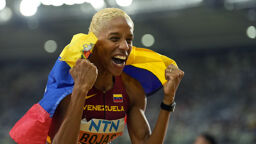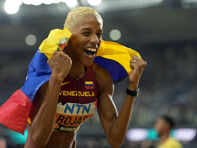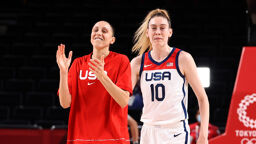Protests against police brutality in response to the killing of George Floyd continue to draw crowds in the thousands across the world two weeks after his death. Those demonstrations have been largely organized and populated by members of the communities in which they’re taking place, but a vast number of public figures have lent their voices, time and resources to the cause as well.
Pro wrestling is no different. Independent wrestling regulars have increasingly used their social media platforms to promote the Black Lives Matter movement and encourage others to donate to funds benefiting the families of victims of police brutality and those currently protesting. For many Black people in the wrestling community, that participation has proven particularly empowering and emotional.
“I cried,” Richmond, VA resident and F1ght Club Pro Wrestling co-promoter Chris Harris told Outsports. “I went to a protest on Saturday. I saw how many people were there. I saw the passion and I sat on the steps of the defaced Robert E. Lee statue and cried.”
Minneapolis-based out pro wrestlers Devon Monroe and Russell Rogue expressed similar feelings alongside Harris on a Thursday’s edition of Outsports’ LGBT In The Ring podcast. “It’s awesome to see other nations around the world who feel the same way that we do, who feel like Black people deserve human rights,” Monroe told Outsports.
“It’s really encouraging to see the dialogue being pushed forward, to see people coming together who used to be so vehemently opposed to Black Lives Matter and to see those people’s minds shift,” Rouge told Outsports.
“Omg why are people saying #BlackLivesMatter so much?!”
— Russell Rogue (@itsrussellrogue) June 1, 2020
Because police violence against the black community has been going on for too long, ESPECIALLY in the Minneapolis-St. Paul metro area. pic.twitter.com/iRyfLJYMyn
At the same time, Rogue stressed the need to highlight violence and police brutality against Black trans people like Tony McDade, Nina Pop and Iyanna Dior within the increased scrutiny born from Floyd’s death.
“[Black trans people] are oftentimes erased from this movement … it’s really unfortunate that marginalized groups within an already marginalized community don’t get as much an opportunity to have their stories told,” Rogue lamented.
That troublesome fact was thrust back into the spotlight as the protests continued into Pride month. Many have been quick to highlight the role of Black and POC trans figures like Marsha P. Johnson and Sylvia Rivera in igniting the push for LGBTQ rights at the Stonewall riots when celebrating the beginning of Pride month. It’s hard to ignore the similarities between the demonstrations on today’s streets and the ones in New York City circa 1969.
“There are a lot of White queer people in particular that are being completely silent or, even worse, saying they don’t approve of the rioting or looting, yet they don’t realize that it was rioting that helped lay the foundation to give them the rights they have today,” said Rogue
✊🏾‼️ #BlackLivesMatter #BlackWrestlersMatter https://t.co/Lyxsq1w3K6 pic.twitter.com/4cBHaQUmxj
— Hawt Gurl Devon 🔥 (@TheDevonMonroe) May 29, 2020
The spreading support for the still growing protest movement inspires hope in many, but a number of Black figures within pro wrestling hold their appreciation while openly asking those speaking out now a key question: what took you so long?
Especially when turning the eye inward on the pro wrestling industry.
“I feel as though some of these promotions and wrestlers are using [the movement] as a free form of promotion or advertisement, “ said Harris. “If I can go in a promotion’s back catalog, look at their shows and count the number of queer or people of color on one hand, then I don’t believe much of what they’re saying.”
Rogue also highlighted the concern that many Black pro wrestlers that raised their voices in service of the Black Lives Matter movement risk losing bookings or potentially their entire careers by doing so.
“As someone who has been told that promoters have said ‘I don’t want to use him because he’s gay,’ it bothers me,” said Rogue. “If we can promote a culture and have promoters book talent for who they are and who they want to be, it’ll result in a much higher quality product. But am I holding my breath? No. I wish I could.”
We are Pro POC.
— F1ght Club Pro Wrestling #PAWDWC (@PAWD_WC) February 16, 2020
We are Pro Black.
We are Pro Trans.
We are Pro LGBTQ+
We. Are. F1ght Club. pic.twitter.com/IZBwDuxyIx
The ever present risk of further discrimination will remain reticent as protests continue to fill American streets and pro wrestling begins to resume operations in step with other COVID-affected industries. But it hasn’t drowned out the hope that some modicum of true, systemic change will result from all the activism, donations, pain and risk.
“These events are happening at a very crucial time. As these protests continue and we continue fighting for change, we can continue to use our voices to convince people to get out there and vote,” said Monroe, who will be eligible to cast his vote in the presidential election for the first time in 2020. “As much as we use our voices and sign petitions, the real change happens at the polls and when we elect officials that are going to fight for us.”
Listen to the entire conversation with Russell Rogue, Devon Monroe and Chris Harris on this week’s episode of the LGBT In The Ring podcast.







































